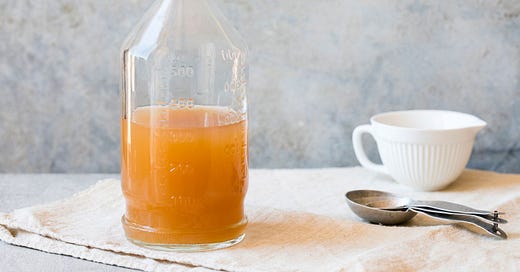It’s Not Cool to Be a Victim
When we identify with our limitations and put ourselves in boxes, we cut off the very belief that fuels growth. That seems like a treacherous way to live.
During my nearly 15-hour journey from my little farmstead on the South Dakota prairie to the luminous city of Pittsburgh, Pennsylvania, I finally had the chance to finish a series that caught my attention a while back: Apple Cider Vinegar. If you’ve ever been swept up in the world of “wellness culture” (I still am, proudly), it probably piqued your interest too.
The series follows Belle Gibson, a pathological liar and wellness influencer who falsely claimed she healed herself from terminal brain cancer using diet and alternative therapies. As a crunchy mama who prefers natural treatments over allopathic ones (though I absolutely respect that there’s a time and place for both), I was instantly intrigued.
As the series unfolds, you learn how Belle manipulated people’s good intentions and trust to sell her app, The Whole Pantry. Did you follow her blog or book? I did. At the time her star was rising, I was finishing my studies in Holistic Nutrition and gearing up to move to Costa Rica as a vegan chef. It was also when I launched Life in Bloom Nutrition.
Despite the similarities, we have many differences, primarily: I never lied about a diagnosis. I openly celebrated how giving attention to my very real (but non-life-threatening) struggles—being overweight, out of breath, and battling cystic acne—transformed my health when I changed my lifestyle.
The confronting part of Apple Cider Vinegar is realizing how many people were hurt by Belle’s misinformation and pseudoscience. And I’ll admit it—at one point, I echoed some of those same beliefs.
But what stuck with me most from Belle’s story?
She lied. About nearly everything.
And that, my friends, leads to the heart of today’s post:
It’s not cool to be a victim.
But isn’t that the cultural norm now?
“I’m on the spectrum.”
“I’m LGBTQ+ and identify as a furry.”
“My pronouns are squid/squidster, and I don’t like loud noises.”
“I have a disability, so I can’t do X, Y, or Z.”
Let me be clear: I fully support people discovering who they are and finding ways to navigate an incredibly harsh world. But what irks me is when people use their perceived limitations as a permanent identity—or worse, as a justification to disengage from growth, responsibility, or resilience.
You are not broken.
You don’t need to bond with others by clinging to what you believe makes you “less than” or unlovable.
In fact, Christ tells us we are already His—already lovable—regardless of how we look, what we identify with, or what struggles we carry. What matters, in my opinion, is showing up with humility each day, striving to love others well, and consistently working to be a better version of ourselves.
If you identify with your illness—or with a label you believe makes you a minority and therefore more entitled than the rest of the population—you risk adopting a mindset that resists growth. And that’s the real trap.
Because here’s the truth: working hard for change is still the only thing that reliably produces results.
Sure, flukes happen. Some people hit the jackpot with timing or luck. But most of us? We have to do the work. We cannot afford to be held back by a personality trait that could be strengthened or a health condition that, in many cases, is within our power to improve—or even eliminate altogether (I’m looking at you, heart disease, obesity, acne...).
In summary:
We are more than what we believe makes us “flawed” or “different.”
We are evolving works of art—embodiments of God.
But when we identify with our limitations and put ourselves in boxes, we cut off the very belief that fuels growth. And to me, that sounds like a treacherous way to live—a small way that leaves no room for beauty, surprise, or transformation.
That’s why I don’t think being a victim is cool. You have the power to change your life—and it starts with your mentality.
Ironically, Belle Gibson’s story serves as both a warning and a mirror. While her actions were wrong, the mindset underneath—the belief that we are owed something because of our pain—is far more widespread. Let’s not fall for it. Let’s be better.
Disagree? Agree? Let’s chat it out in the comments—respectfully, please.
Much love,
MF




